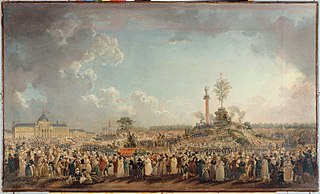最高主宰崇拜

最高主宰崇拜(法語:Culte de l'Être suprême)是法国革命时期罗伯斯庇尔试图建立的一套自然神论[1][2],并试图将其确立为法蘭西第一共和國的国教以取代天主教[3][4]。
起源[编辑]
法國大革命為法國帶來許多劇烈的變化,但對於一個天主教國家而言最根本的變化便是官方開始抵制宗教。第一個主要而有組織的學派在理性崇拜的保護傘下出現。倡議者多為激進人士如雅克-勒内·埃贝尔以及安托万-弗朗索瓦·莫莫罗,理性崇拜主要是把無神論的觀點混合進入人類中心主義哲學的思考中萃取而成。該派別並不敬拜任何神—指導原則是必須投入到理性的抽象概念[5]。
對所有神祇的拒絕震驚了羅伯斯庇爾,並因為其實行中「諷刺的場景」和「狂野的裝扮」而更加劇了它對羅伯斯庇爾的冒犯[6]。在1793年末,羅伯斯庇爾對理性崇拜及其支持者發表了強烈的譴責[7],並著手準備自己對於恰當的革命宗教的看法。在1794年5月7日,法國國民公會之前,幾乎完全由羅伯斯庇爾構思的「最高主宰崇拜(法語:Le culte de l'Être suprême)」正式公布[8]。

宗教倾向[编辑]
羅伯斯庇爾相信理性只是達到目的的手段,而此非凡的目的就是美德。他試著要突破單純的自然神論(常被支持者稱作伏爾泰思想)來創造新的目的,在他看來,必須對神祇有更合理的投入。最高主宰崇拜的一個主要原則就是信仰單一神的存在以及人類靈魂的不朽[9]。雖然與基督教教義不相牴觸,但這些信仰付諸於對羅伯斯庇爾更全面意義上的服務,即是羅伯斯庇爾歸功於羅馬人與希臘人的公民意識與公共道德[10]。這種美德只能透過對自由與民主積極的忠誠來實現[11]。羅伯斯庇爾認為,相信一位永生的神與更高的道德標準,可以「經常提醒必須實現正義」,並因此對共和社會是至關重要[12]。
革命冲击[编辑]
羅伯斯庇爾使用宗教刊物來公開譴責許多其他陣營的激進團體,並直接或間接地導致了革命的反基督教人士如雅克-勒内·埃贝尔、莫莫羅與阿纳卡西斯·克洛茨的處決[6]。最高主宰崇拜的建立,代表推翻之前頗受官方青睞的大規模去基督教化運動的開始[13]。同時標誌了羅伯斯庇爾權力的最高點。雖然理論上他只是公共安全委員會中平等的一員,但羅伯斯庇爾此時在法國境內已經擁有了全國性的聲望[14]。
最高主宰崇拜的相关节日[编辑]

皮埃尔-安托万·德马希作(1794年)
為了開闢新的國教,羅伯斯庇爾宣布共和曆二年牧月20日(1794年6月8日)是最高主宰崇拜國家節慶的第一天,且未來的共和假期會在新法國共和曆的每一個第十天—休息日(法語:décadi)[8]。每一個地區都必須舉行紀念活動,而在巴黎的活動是設計成大規模的型式,由藝術家雅克-路易·大衛所組織,並在戰神廣場上的人造山周圍舉行[15]。羅伯斯庇爾承擔了所有活動的領導地位,這個強制的行為對很多人來說是十分招搖的[16],這宣告了其新宗教的真理和「社會效用」[17]。
后世影响[编辑]
最高主宰崇拜以及其節慶可以說是促成了熱月政變及羅伯斯庇爾的倒台[17]。羅伯斯庇爾於1794年7月28日死於斷頭台,最高主宰崇拜失去了一切的官方承認,並從此消失在大眾的視線中[18]。並在拿破崙一世頒布「共和曆10年芽月18日教派法」後正式禁止[19]。
參見[编辑]
註釋[编辑]
- ^ a: 法文中的「教派」一字意思是「崇拜的形式」,沒有英文中負面或排外的涵義:羅伯斯庇爾打算以此來吸引普遍會眾。
参考資料[编辑]
- ^ Jordan, David P. (1985);The Revolutionary Career of Maximilien Robespierre; University of Chicago Press, 1985; ch.11.
- ^ Jordan, pp. 199ff.
- ^ Neely, Sylvia (2008); A Concise History of the French Revolution; Rowman & Littlefield; See p.212 (页面存档备份,存于互联网档案馆): "...(T)he Convention authorized the creation of a civic religion, the Cult of the Supreme Being. On May 7, Robespierre introduced the legislation...."
- ^ Neely, p. 212: "(T)he Convention authorized the creation of a civic religion, the Cult of the Supreme Being. On May 7, Robespierre introduced the legislation...."
- ^ Kennedy, p. 343: "Momoro explained, 'Liberty, reason, truth are only abstract beings. They are not gods....'"
- ^ 6.0 6.1 Kennedy, p. 344.
- ^ Kennedy, p. 344: "Robespierre lashed out against de-Christianization in the Convention...."
- ^ 8.0 8.1 Doyle, p. 276 .
- ^ Kennedy, p. 345.: "Robespierre followed a consistent line of argument...(that) God exists and that the soul is immortal."
- ^ Žižek, p. 111: "I [Robespierre] am talking about the public virtue that worked such prodigies in Greece and Rome, and that should produce far more astonishing ones in republican France...."
- ^ Lyman, pp. 71–72.
- ^ Doyle, p. 276.: "[Robespierre] proclaim[ed] that the French people recognized the existence of a Supreme Being and the immortality of the soul. These principles, declared Robespierre to applause, were a continual reminder of justice, and were therefore social and republican." See also p.262: "[Robespierre] believed that religious faith was indispensable to orderly, civilized society".
- ^ Kennedy, p. 344.: "Robespierre's influence was such that the de-Chistianization movement rapidly slackened...."
- ^ Doyle, p. 277.: "He seemed to be speaking for the Committee of Public Safety more and more, and was certainly better known in the country at large than any of his colleagues. At Orléans, as well as in Paris, the Festival of the Supreme Being took place to cries of "Vive Robespierre"."
- ^ Hanson, p.95:"...[T]he Champ de Mars where David had created an enormous symbolic mountain."
- ^ Doyle, p. 277: "'Look at the bugger,' muttered Thuriot, an old associate of Danton. 'It's not enough for him to be master, he has to be God.'"
- ^ 17.0 17.1 Kennedy, p. 345.
- ^ Neely, p. 230: "The fall of Robespierre brought an end to the Cult of the Supreme Being with which he had been closely identified. The new civic religion... had not had a chance to win many converts."
- ^ Doyle, p. 389.
參考書目[编辑]
- Doyle, William. The Oxford History of the French Revolution. Clarendon Press. 1989 [2015-08-24]. ISBN 0-19-822781-7. (原始内容存档于2016-06-17).
- Hanson, Paul R. Historical Dictionary of the French Revolution. Lanham, MD: Scarecrow Press. 2004 [2015-08-24]. ISBN 0-8108-5052-4. (原始内容存档于2016-05-27).
- Jordan, David P. The Revolutionary Career of Maximilien Robespierre. University of Chicago Press. 1985 [2015-08-24]. ISBN 0-226-41037-4. (原始内容存档于2016-05-07).
- Kennedy, Emmet. A Cultural History of the French Revolution. Yale University Press. 1989 [2015-08-24]. ISBN 0-300-04426-7. (原始内容存档于2016-05-13).
- Lyman, Richard W.; Spitz, Lewis W. Major Crises in Western Civilization, Vol. 2. New York: Harcourt, Brace & World. 1965 [2015-08-24]. (原始内容存档于2016-04-24).
- Neely, Sylvia. A Concise History of the French Revolution. Rowman & Littlefield. 2008 [2015-08-24]. ISBN 0-7425-3411-1. (原始内容存档于2016-05-27).
- Žižek, Slavoj. Robespierre: Virtue and Terror. New York: Verso. 2007 [2015-08-24]. ISBN 1-84467-584-X. (原始内容存档于2016-05-02).
延伸閱讀[编辑]
- Rousseau's religious ideas with reference to the religious ideas prominent in the revolution and to their influence on Robespierre and Saint Just(页面存档备份,存于互联网档案馆),Elma Gillespie Martin的博士論文(康乃爾大學,1918年)
外部連結[编辑]
- The Supreme Being (页面存档备份,存于互联网档案馆), by Maximilien Robespierre. Source: Internet Modern History Sourcebook, Fordham University, NY.
- Decree on Worship of the Supreme Being (页面存档备份,存于互联网档案馆) Source: Church and state in the modern age: a documentary history; J. F. Maclear, ed.; Oxford Univ. Press, 1999.
